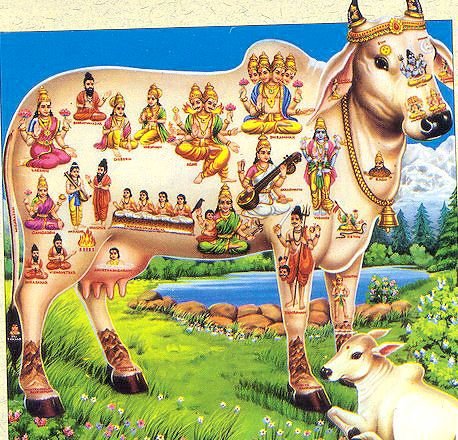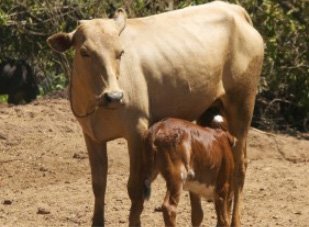Cow Slaughter - Born to Divinity, Doomed to Slaughter

Introduction
Lord Krishna declares his manifestation as Kamadhenu, the celestial cow that fulfils all wishes and is referred to as the Surabhi cow. He further explains how these cows achieved their exalted and elevated status, representing a portion of Krishna’s supreme energy.[1]
Celestial Origins
Descended from celestial origins, and drawing from the fragrance of the nectar of the heavenly worlds, the Surabhi cow is an incarnation of the benefits of all things living. The Indian Desi sacred cows with a hump on their backs and soft dewlaps below their ears are the only true descendants of the Surabhi cows. Because all cows in the world are descendants of the sacred Surabhi cows of India, they too are holy, and deserve to be protected and treated with respect and admiration. Causing harm to the cows or even conjecturing their slaughter and worst still, eating their meat, is the greatest of all sins.
The Universal Benefactor
Cows are the abode and a mother of 330 million (33 Crores) demigods that manage the universal material existence of creation. Cows have the status of Goddesses and are the veritable sanctuary of auspiciousness. They are not only venerational for the happiness they bestow on us, but also for their milk that supports and nourishes people of the world, and their ghee used in sacrifice that that pleases the Gods.
Ownership
The Bhagavat Gita lays down strict qualifications for owning a cow. He must be righteous, truthful, one who follows the Vedas, one who loves cows and has good references, willing to undertake cows in distress and their calves, as well as those cows which a farmer who is unable to look after and brings to him for sanctuary. All these factors need verification well in advance.[2]
Enhances the Purity of Rituals
The cows serve humanity with the blessing of their milk that is equated to ambrosial nectar, yoghurt, cheese, butter and particularly ghee that constitute the vital ingredient in the Brahman’s sacrificial fires, enhancing the purity of the sacred rituals and holy activities. It goes without saying that all sacred acts originate with the cow, and establishes its exalted position in terms of purity, sublimation and pre-eminence over all animals living in this world.
Hell and Heaven
The Vedic scriptures recommend offering respect and nourishment for the cows and bulls, and never pander to even a thought about justifying its slaughter and consumption of its sacred meat. Vedic Scriptures prophesize miserable hell for the offenders with no chance whatsoever for atonement. Years of suffering in hell, equivalent to each hair on the cow’s body, are the certain punishment for cow slaughterers and its meat eaters. On the other hand, those exalted living beings that gift a sacred cow to an indoctrinated Brahman or a Vaishnava, belonging to the one of the four sampradayas of the Vedic Culture, will earn heavenly abode in years, equivalent to every hair of the cow’s body.
Pathway to Heaven
Eternal growth and evolution depend on the cows that represent both the past and the future. All of the mantras like the “Vashat” and the “Swaha” form vital components of Vedic rituals of which the cow’s ghee is a paramount ingredient in all sacred rites. Moreover, the cows on earth are steeped in auspiciousness, high energy, exertion and strength, imparting happiness and wisdom to all creatures in the world. Those countries that offer them safety, solace and protection from slaughter will find absolution from sin and a pathway to heaven.
Perspectives of Cow Slaughter
In medieval times, those who slaughtered cows and deprived others of milk must face the ax on the king’s orders.[1]
It was expostulated strongly that those who have become slaves to the serious addiction of consuming meat or eggs, be it cooked or uncooked, must be punished with death.[3]
Another perspective to cow slaughter that castigates the ignorant and evil people who put up a virtuous facade, but take a lead in animal slaughter without remorse and fear of punishment, theorizes that those very men, in their next avatar, will face a gruesome death at the hands of the very same animals.[4]
Killing of animals was proscribed even the Bible, which likened the killing of an ox to that of killing a man, sacrificing a lamb is akin to slitting your dog’s throat and those who enjoy slaughter suffer the abominations of their actions.[5]
Conclusion
All the foregoing points go to illustrate that the Vedic scriptures never sanctioned cow slaughter, but strictly forbade them. Surprisingly, the Christian Religion also does not sanction cow slaughter.
References:
- [1] Chapter 10, verse 28 of the Bhagavad-Gita.
- [2] The Rig Veda X.87.16.
- [3] The Atharva Veda VIII.6.23.
- [4] The Srimad Bhagavatam, Canto 11, chapter 5, verse 14.
- [5] The Old Testament of the Bible.
Help Us Now

Donate to Surabhivana Gaushala to save and protect Indian Cow Breeds.
All donations are exempt under Section 80G of the Income Tax Act, 1961. All donation receipts shall be mailed to the address given by the donor or may be collected in person, at request.
Click the below button to donate through credit cards/debit cards or Net Banking via Razor Pay.
